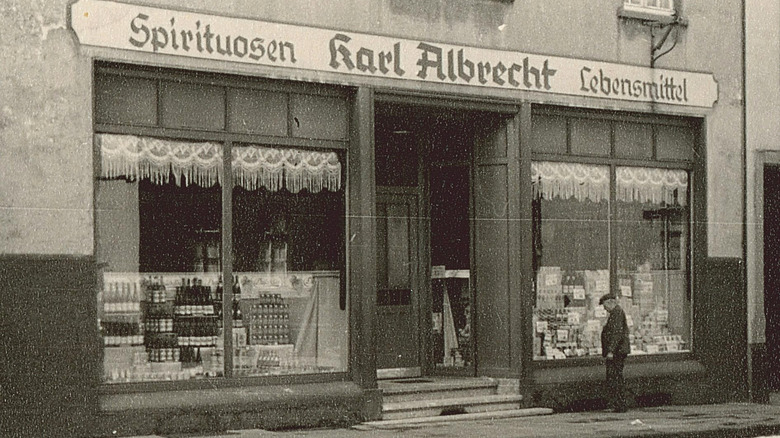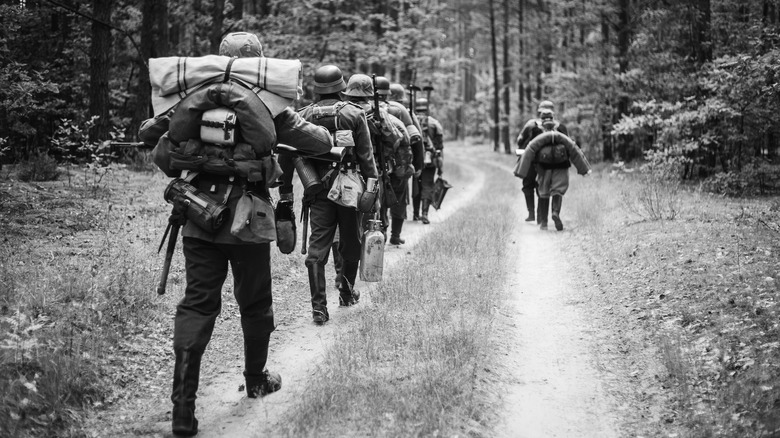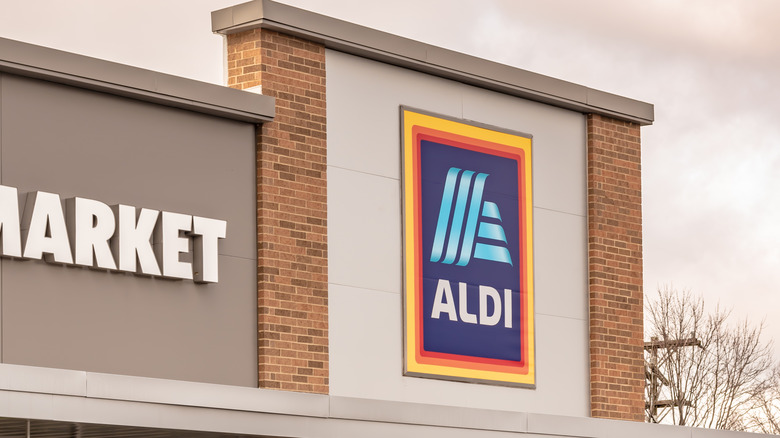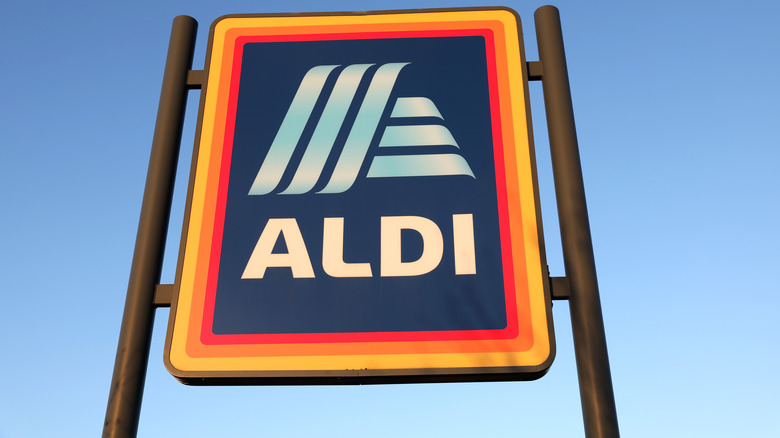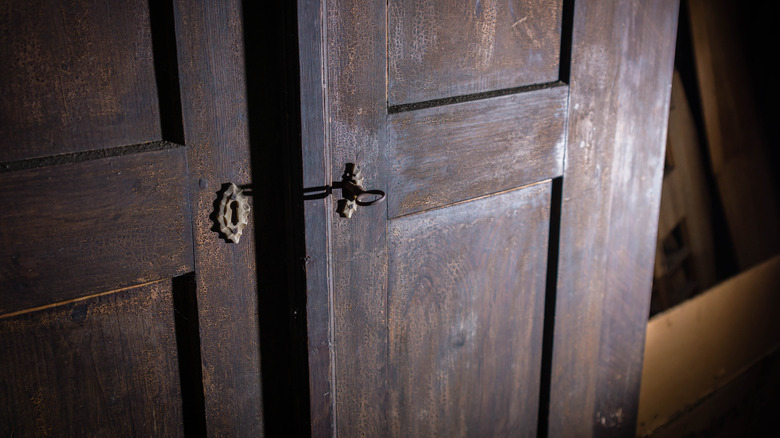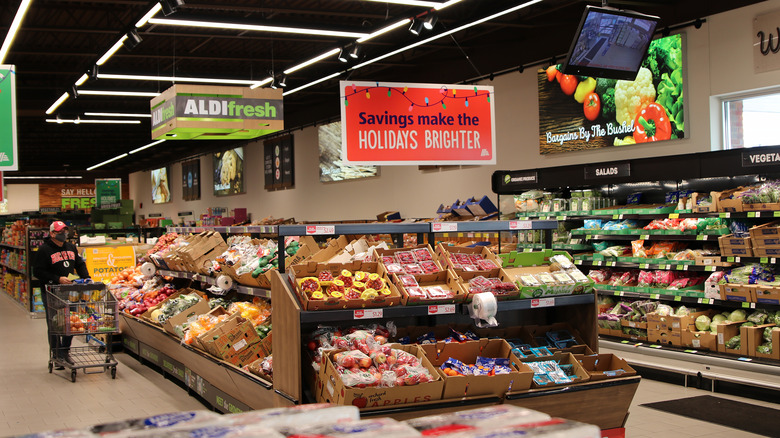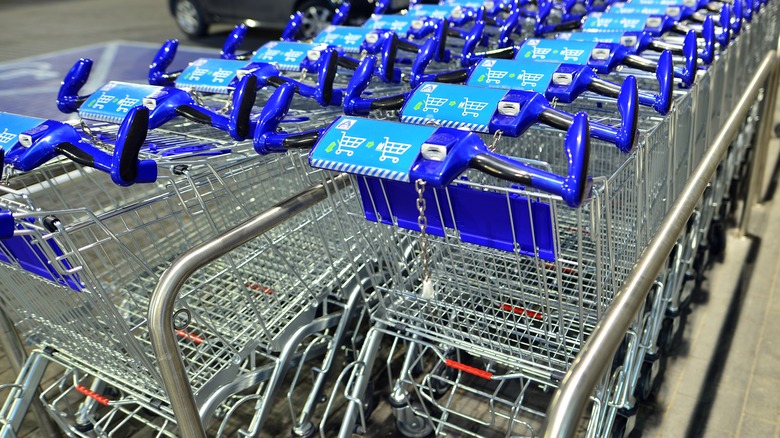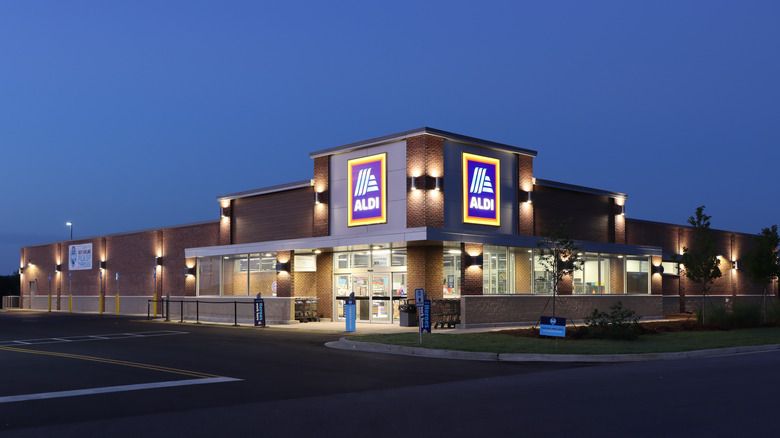Here's What You Need To Know About Aldi's German Heritage
When Aldi first opened in the United States, it changed the way Americans grocery shop forever. According to Finance Buzz, in 2022 alone, over 1 million new shoppers turned to the discount retailer in response to inflation at the checkout. The reason people enjoy the bare-bones shopping experience so much is because the prices at Aldi mirror those you might find at Sam's Club or Costco, but you don't need a membership to shop there. You also don't have to buy in bulk to enjoy the savings at Aldi, which can appeal to shoppers buying food for just themselves, or those with limited storage space at home.
Given the novelty of the Aldi shopping experience, some Aldi fans might be surprised to know that the store is actually over 100 years old. Not only that, but the German grocery store chain has a turbulent history in addition to ridiculously great savings on shopping. We aren't sure if there are a lot of skeletons in Costco's closet, but Aldi's origin story isn't to be missed.
Aldi's first store opened in Germany in 1913
Aldi had humble beginnings as a small, family-owned store in Essen, a mid-size city in the northwestern part of Germany, not too far from the Dutch border. According to the Independent, Heustrasse, or Hay Street, in the industrial area of town was once home to the Karl Albrecht Spiritousen and Lebensmittel shop, meaning a food and drink shop. The Albrecht family had originally opened the store in 1913 when its patriarch developed the deadly lung condition emphysema as a result of working in the local mines. When the family could not count on their father's paycheck anymore, they turned to retail to make ends meet instead.
Brothers Theo and Karl ultimately took a great interest in the family business. After seeing what had happened to their father, both men knew they didn't want to work in the mines and potentially develop the same sickness. To avoid this fate, Theo worked in the shop and learned how to run the overall business, while Karl worked as the in-house butcher. While the shop was successful, it was by no means what would one day make Theo and Karl Albrecht billionaires.
The founding brothers had a military past
According to the Independent, both Albrecht brothers fought during World War II. The outlet states they were involved with the German Wehrmacht, which is another name for the German military when the Nazi regime controlled the country. The New York Times notes that both brothers were drafted into the army, rather than willingly enlisting. As both brothers were immensely private in all aspects of their life, there is not readily available published information regarding their feelings or recollections about their time in the Wehrmacht.
What is published is that Karl was badly hurt on the Russian front and was subsequently captured by the Allied troops there. Theo was sent to North Africa and was eventually captured by Allied troops in Tunisia, per The New York Times. Both brothers spent time in the Allies' prisoner-of-war camps before their eventual release at the end of the war and subsequent return to life in Essen.
The first few Aldi stores thrived despite a poor economy
When World War II ended, much of Germany had been completely destroyed by the fighting. Buildings were bombed out, and the financial situation in the country, just like at the end of World War I, was bleak. Modern Germans have a special word to describe the eventual recovery of their country's economy – Wirtschaftswunder, or the "German economic miracle," per Investopedia.
When Karl and Theo Albrecht returned to their hometown of Essen, a small miracle of their own had occurred: Although most of the city was in ruins, their family grocery store was still standing. It had somehow avoided all the bombings of the city, according to CNBC.
In 1946, the brothers decided to officially open Aldi as we know it today, named as such as a sort of abbreviation for "Albrecht Discount." Because economic times were tough, the brothers based their business model on a very simple principle: Only sell what would sell. This means that they kept prices low, sold only non-perishable items, and cut items from the inventory that weren't doing well without any consideration. Due to these extreme cost-cutting measures, prices were less than competing grocery stores, which attracted a lot of business. Because of this popularity, the brothers were able to open four more stores in Essen by 1948.
Aldi split in half due to a family feud
Unfortunately, as the family business continued to grow in popularity and expand across Germany, Theo and Karl Albrecht began to fight over the correct way to run the stores. According to The Guardian, one thing the brothers couldn't see eye to eye on was over whether or not they should sell cigarettes at Aldi. Theo wanted to sell cigarettes as he thought they would be profitable, but Karl was concerned that the people who were likely to purchase cigarettes at the time would just steal them from the stores instead.
This fight occurred in 1961, when the brothers jointly owned 300 Aldi stores. But by this point, they had officially reached their limit, as noted by CNBC. So, they decided to part ways ... kind of. The business was split in half, with Theo and Karl taking the Aldis to the north and south, respectively. The so-called "Aldi Equator" which divided these two wings went right through the middle of the brothers' hometown of Essen, per The Guardian. The stores did share information for a while, including supplier contracts, but never anything financial. Most of the products sold at each store were completely different from each other; however, the most defining feature after the split was the color of the floor, as one chain's floor was yellow and one's was gray.
There are reports both sides may remerge
Since the 1961 split, many Germans have stayed loyal to their local Aldi, depending on the part of the country they live in. Aldi South has expanded business to many other parts of Europe, including the U.K., as well as across Australia and the United States. Aldi North mostly does business in Germany but has a presence in the U.S., just under a different name: Trader Joe's. According to Reader's Digest, Trader Joe's founder Joe Coulombe sold his business to Theo Albrecht in 1979, and the Albrechts still own the grocery chain.
Reports of a planned merger, or at least close cooperation between the two branches, first broke in early 2020. According to the USDA, Aldi South and Aldi North had plans to merge production of most of their private-label foods by the end of the year. Both brands also announced plans to work more closely together when sourcing products, to avoid redundancies. Finally, the formation of the "North South company" also allows for both stores to use the same credit card processor. The reasoning behind the intention to cooperate fits in perfectly with the founding principles of Aldi: saving money. By working together, the companies can cut down on repeated costs.
One founder was kidnapped in 1971
In 1971, tragedy struck the Aldi empire when founding brother Theo Albrecht suddenly went missing. According to The Guardian, Paul Kron and Heinz Joachim Ollenburg kidnapped Albrecht at gunpoint (via The Sydney Morning Herald) and transported him to the city of Düsseldorf in West Germany. There, they held him hostage inside a wardrobe for 17 days. In the end, he was only freed when his family agreed to pay his ransom of 7 million deutschmarks. Each man received a sentence of 8.5 years in prison for their role in the crime. They were caught when Kron used one of the bills supplied in the ransom to pay in a local shop. However, the rest of the ransom money seemingly disappeared. Kron told a German newspaper, "Honestly, I don't know [about the missing money]. I only got 10,000 deutschmarks from Ollenburg. He was cleverer than me" (via The Guardian). Ollenburg never told the public what happened to the rest of the money.
Theo Albrecht was understandably traumatized by the entire experience. He was hardly seen in public after his release and preferred to live privately. However, it is widely reported that the initial ransom his attackers asked for was much larger than the one they eventually received. Albrecht allegedly negotiated them down to a more reasonable sum. When he was released, he wrote the amount off on his taxes — claiming it to be the cost of doing business (via the Independent).
The family is still fighting over the Aldi fortune today
Aldi is no stranger to tense family relationships, and the infighting that led the founding brothers to split their chain down the middle still exists in the family today. When Theo Albrecht died, he left his Aldi fortune under the control of his wife, Cäcilie. When she passed away in 2018, her will left very specific instructions for her son Berthold's widow, Babette Albrecht (pictured), and their children. "With this document I undertake to ensure the preservation of the philosophy of our family, which is to serve the consortium Aldi Nord and to foster this, at the same time as setting aside self-interests and practicing a modest and abstemious way of life," her will states, according to the German newspaper Bild am Sonntag, as translated by News.com.au.
Yet even with the will stating that the family must live a modest lifestyle, regardless of the money they inherit, Cäcilie always had her doubts. "Berthold himself said when he was alive that he had considerable doubts as to the suitability of his children to respect the life's work of my husband," her will stated. Babette is a socialite often seen at public events. When her husband passed away, he made provisions in his will to exclude her from running Aldi in the future, though we wasn't successful in this regard. Babette and her children were also excluded from Cäcilie's funeral.
The store's frugal staffing is due to German culture
When shopping at Aldi, you might notice that there doesn't seem to be as many employees around as at other grocery stores. It isn't that everyone called in sick, but rather that the roster is kept slim on purpose to reduce operating costs. This staffing practice is due in part to the German cultural value of saving money. According to Quartz, Germans began to consider saving money as a sign of being a good person in the early 1800s. Germany fell into financial ruin during World War I, and the country and its citizens continued to experience severe financial problems in the years following the war, which unfortunately contributed to support for the Nazi regime throughout the 1930s, leading up to World War II. Even after the war, when Germany was divided into East and West and ultimately officially reunited in 1990, the idea that a moral person saves money has persisted.
Since Aldi was founded in 1913 in the midst of a German financial crisis, the company seems to value providing value to customers for the smallest price possible. Although employees tend to be compensated above the average minimum wage in the United States, Aldi personnel report that there are typically only two to four people working in the store at any given time, on average (via Indeed). This smaller workforce saves the company money on its bottom line.
Aldi makes customers do work to save money
German culture is a frugal one. Germans tend to be straightforward, results-oriented, and interested in saving money. According to Culture Atlas, Germans have a saying, "Ordnung muss sein," which means "There must be order." This comes across culturally in that Germans tend to appreciate rules and work toward goals individually. While the American culture tends to prioritize making friends with everyone and receiving customer service with a smile, Germans prefer the task to take priority and don't mind if the checkout worker is friendly or not.
You can see this cultural value in a few of Aldi's operations choices. For example, Aldi makes customers do work to save the store money. Frequent shoppers at Aldi will notice that most of the products on the shelves come in boxes (via Harvard University). This saves the Aldi employees who stock the shelves a lot of time. They don't have to individually unload each box but can just place the entire box instead. Shoppers are then required to unload the individual items into their cart. When the shopper reaches the checkout line, the employee does not bag up items. The customer must move to a secondary location and do this themselves — saving Aldi from hiring a bagger. The same can be said for needing a coin to use a shopping cart. If buyers want their coin back, they must return the cart. This means Aldi doesn't need to pay for cart attendants, either.
Aldi's operating hours are influenced by European norms
While many grocery stores in the United States tend to operate on a schedule with extended hours (we're looking at you, 24-hour Walmarts), you might notice that Aldi closes a lot earlier. A quick search of the supermarket's locations shows that most of its stores open at 9 a.m. and close at 8 p.m. This gives shoppers a lot less time each day to shop for their essentials. However, while Americans might be used to picking up some milk, bread, and eggs whenever the craving strikes, it is very different for Germans.
According to The Local, stores in Germany have shorter opening hours to accommodate time off for those who work there. In fact, when compared to the rest of Europe, German laws around operating hours are some of the strictest out there. The first laws were written in 1900. Along with restrictions around the time of day that shops were open, the laws also set rules on the days of the week stores could sell, too. Even though Germany is not a particularly religious country, nearly all the shops are closed on Sundays. This is to encourage rest and relaxation for all workers, even those in retail positions. So while German Aldi stores are closed each Sunday, you can still see this German influence on the shops in the States through reduced operating hours.
The grocer's bread machines are German inspired
Bread is a pretty big deal in Germany. On average, one German will eat about 192 pounds of bread each year, according to The Wall Street Journal. There is a tradition in the country of visiting local bakers to pick up bread for breakfast rolls, sandwiches, and snacks. The bread is fresh and baked in-house. Aldi South, which operates across southern Germany, the U.S., U.K., and Australia, built on this tradition to include a similar service in its stores. The only problem is that it doesn't come with a baker. The bread machines are automatic, which struck a chord with bakers across Germany.
"We are not against Aldi selling bread," Peter Becker, a baker from the German city of Hamburg, told WSJ. "But it's unfair for them to say that it's somehow better or different than the packaged stuff they sell on their shelves." Becker's suggestion that the bread coming from the machine is not freshly baked has merit, as the rolls are very similar to bread customers can grab elsewhere in the store. In 2018, Aldi South began to make plans to expand its in-house bakery to stores outside of Germany as well. Per Fox 23, customers of select stores in Illinois, Maryland, and Wisconsin were able to enjoy variety of fresh breads baked on-site each day. In the end, it sounds like the German bakers might have won out.

